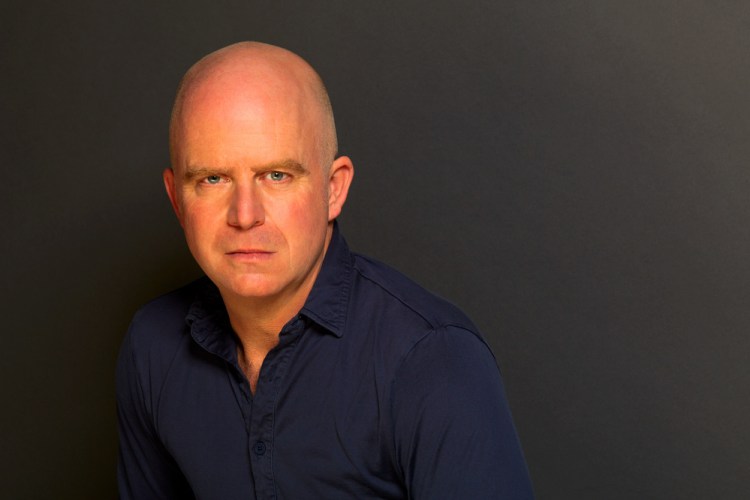How do you define the modern American hero? In the age of international terrorism, when guns are drawn, bombs armed and missiles launched, don’t you want someone who is, above all else, competent? Not necessarily a stone-cold killer – although a single-minded implacability can come in handy – but someone who can get the job done right, with maximum focus and minimum complaining?
In the realm of espionage fiction, the guy you want may well be Dewey Andreas, the never-give-up hero of Ben Coes’ six-book series of international thrillers. Fresh from foiling a plot to detonate a 30-kiloton nuclear bomb near the Statue of Liberty in last year’s “Independence Day,” former Army Ranger, ex-CIA operative and Maine native Andreas returns to the Big Apple for a deadly assignment in “First Strike.”
Although it boasts a present-day “ripped from the headlines” plot, “First Strike” is actually a kind of alternate history, one in which the United States government provides the funds for creating the Islamic State terrorist group. In the opening chapters, Mark Raditz, the deputy U.S. secretary of defense, makes a covert $2 billion arms-for-influence deal with Tristan Nazir, an imprisoned, Oxford-educated finance expert groomed to be the most powerful leader in the Middle East.

In exchange for weapons, Raditz expects Nazir to decree the United States and its allies off-limits from terrorist attack. Nazir instead double-crosses Raditz, creates the organization now known as ISIS and, years later, literally brings the war on terror to the hapless bureaucrat’s doorstep by kidnapping and threatening to kill his daughter and ex-wife unless he provides another shipment of guns and missiles.
Meanwhile, Marwan Al-Jaheishi, one of Nazir’s most trusted subordinates, has the evidence of Raditz’s black ops program and plans to use it as a bargaining chip in seeking asylum in the West.
At the behest of his good friend Hector Calibrisi, director of the CIA, Dewey Andreas finds himself being dropped into Syria by the Israeli military, with orders to extract Al-Jaheishi and his information. He arrives in Damascus just in time to watch the entire operation go up in a storm of gunfire and blood.
From that point, the plot of “First Strike” drops into high gear, with Andreas confronted with one life-or-death situation after another. His mission will eventually take him back to the East Coast, where Nazir has coordinated a deadly attack on a Columbia University dorm. As luck would have it, one of the hostages just happens to be Daisy Calibrisi, daughter of the CIA director and Dewey’s potential romantic interest.
Coes lives with his family in Wellesley, Massachusetts, and has a residence in midcoast Maine. A speechwriter for Ronald Reagan and George H.W. Bush, Coes has worked for T. Boone Pickens and was campaign manager for Mitt Romney’s successful run for Massachusetts governor. “First Strike” reveals him as an author comfortable with military and policy jargon but also capable of choreographing intricate action scenes.
The book mixes the technophilia of Tom Clancy with the lone-wolf ethos of Lee Child, with a dash of John McClane’s working-class insouciance from the cinematic “Die Hard” franchise.
For a reader new to the series, though, Dewey is a hard character to get a handle on. It’s clear that he’s led an insanely eventful life. Coes writes, “Since Boston College, Dewey had been a soldier, a roughneck on a succession of offshore oil platforms off the coasts of the UK, Africa and South America, a ranchhand, a CIA agent, and for a brief time, an accused murderer rotting away in a Georgia jail cell.”
He has also lost a son, a fiance and various friends and colleagues. He’s been physically injured, mentally abused and somehow managed to put the pieces together again.
Yet for all those details, Dewey remains somewhat opaque as a main character. Although he has a reputation as a rogue agent, he pretty much does what is expected of him, even when he has a knife at his throat. (He snarls at the ISIS military commander, “We’re going to kill every last one of you [expletive].”)
Dewey’s no-nonsense demeanor actually works in his favor, though. When terrorists are throwing college students out 10th-story windows, perhaps you don’t need a hero who gets tied up in a lot of soul-searching. Better to rely on a man of action with direct access to – and the complete confidence of – the president of the United States. (One named J.P. Dellenbaugh, who most assuredly is not based on Barack Obama.)
There’s not a lot of thematic ambiguity in “First Strike.” The good guys and the bad guys are readily distinguishable.
Coes gives Nazir a little bit of backstory to explain his hatred of the West and why he wears an eyepatch, but the revelations are not particularly illuminating. The ISIS attackers at Columbia are ciphers with names like Sirhan, Fahd, Omar and Ramzee and few other distinguishing features.
At a time when some people seem quick to equate particular ethnic and religious backgrounds with terrorism, the lack of counterbalancing Middle Eastern characters in the novel might strike readers as troubling.
But “First Strike” delivers what it promises as a thriller – hard-hitting action scenes, well-researched settings, sudden plot reversals, and tough, likeable characters who know how to keep America safe.
Its greatest asset is the slightly inscrutable and seemingly indestructible Dewey Andreas.
Berkeley writer Michael Berry is a Portsmouth, New Hampshire, native who has contributed to Salon, the San Francisco Chronicle, New Hampshire Magazine, the Los Angeles Review of Books and many other publications. He can be contacted at:
mikeberry@mindspring.com
Twitter: mlberry
Send questions/comments to the editors.


